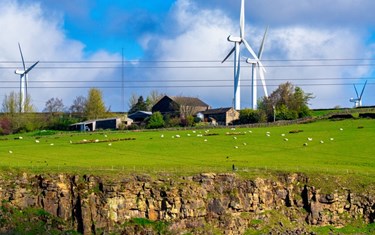November 2021
About the RTPI
The Royal Town Planning Institute (RTPI) champions the power of planning in creating sustainable, prosperous places and vibrant communities. We have over 26,000 members in the private, public, academic and voluntary sectors. Using our expertise and research we bring evidence and thought leadership to shape planning policies and thinking, putting the profession at the heart of society's big debates. We set the standards of planning education and professional behaviour that give our members, wherever they work in the world, a unique ability to meet complex economic, social environmental and cultural challenges.
This is the RTPI’s response to the Department for Business, Energy & Industrial Strategy consultation on Proposals for heat network zoning.
Read the RTPI's full response below or download it in PDF here.
General Comments
It is important that more thought is given to how the proposals discussed in the consultation will integrate and align effectively with the Town and Country Planning Act (TCPA) system. This includes the forward planning of development (principally) by local authorities and the control of development, including through (but not limited to) the planning application process.
Discussion in the consultation document has a limited view on the scope of TCPA planning to help underpin the delivery of heat networks. Although it operates within a regulatory framework planning has significant potential as an ‘enabler’. Research carried out for the RTPI looking at smart energy[1] highlighted that how we plan places, the standards of development required and the location of what is consented, will all affect emissions and the pace of decarbonisation. Chapter 5 in the research considered the challenges of decarbonising heating and cooling. In doing so, it looked not just at the likely impacts on the built environment the planning system would need to address but also at planning’s role as an enabler. The research underlined that Local Planning Authorities “can have an important role in bringing together potential heat customers and facilitating mixed used development, rather than purely residential environments, and at sufficiently high densities to help underpin the viability of networks. Planning policy can also provide support by requiring new development to connect to existing networks, or to be built “connection ready” and LDOs [Local Development Orders] can be used to grant planning permission for heat network infrastructure in an area.”
Heat networks & net-zero
Q1. Do you have views on how local area energy mapping and planning can best support heat network zoning?
Yes.
The relationship between local area energy planning as discussed in the consultation document and TCPA forward planning which can include some form of local energy planning needs to be clearer. There should be workable integration at various stages of the processes, including in assembling the data that is relevant to both planning networks and planning new development to be served by networks. Local area energy planning should also pay attention to the TCPA’s potential to direct growth / new buildings to potential / heat network zones.
2. Do you agree or disagree that the scope of the proposed zoning policy should prioritise district heat networks with cooling permitted but not required? If you disagree, please explain your reasoning.
Disagree.
We are concerned that individual air conditioning units damage the environment, can give rise to noise that adversely affects neighbours and drop heat adding to heat impacts on those who cannot afford air conditioning. Individual units can also be difficult to install on listed buildings and could adversely affect the appearance of conservation areas.
5. Do you agree or disagree that some functions should be carried out centrally? If you disagree, please indicate why.
Disagree, further analysis is required.
We set out below concerns about how the heat network priority map can be established at the national level. Additionally, the proposed functions of central government set out on page 20 include “Establishing an appeal process for decisions taken in the zone designation and operation stages”. As new development in a zone would be required to connect to a heat network, consideration needs to be given to how the envisaged appeal process aligns with TCPA processes including the examination of plans and determination of planning applications.
15. Do you agree or disagree with our proposal for how zone identification should be undertaken?
Disagree.
We encourage government to consider whether the envisaged process for identifying and designating zones adequately reflects TCPA forward planning as a shaper of development and places. We question whether a robust national heat network zone priority map can be drawn up without taking account of local authority plans for the development of their area. And at the local level step, there is no recognition that local planning can steer development that would support, or benefit from a heat network, to areas where a network is being planned or considered.
Without more attention to the interface between the proposal and TCPA forward planning there is a risk that timeframes might not align. How, for example, does government intend that designated zones are fed into TCPA forward planning, and ultimately development management decisions? Will there be any expected alignment between consultation on local plan updates and establishing the zones? How does government anticipate an appeal decision on the identification of a zone aligns with TCPA planning? TCPA forward planning may already have identified the zone in a local plan, or be proposing to do so. And the examination of a TCPA local plan by the Planning Inspectorate (either undertaken or forthcoming) may have comment on the proposed zone (or anticipated development) that is relevant to the appeal.
Requiring connections (buildings and heat sources)
20. Do you agree or disagree that the option 3 level of ambition is a proportionate approach to deliver the policy objectives of heat network zoning? Please provide evidence to support your answer.
Agree.
We agree with the level of ambition. We would also note that all three options would require new buildings to connect and involve using TCPA planning to require connections. While this seems sensible, it underlines the need to think through alignment with the planning system specifically on planning appeals.
Exemptions
25. Do you agree or disagree that a process is necessary to assess, where requested, whether an individual building should be exempt from the requirement to connect to the heat network within a zone?
Agree.
However, if it is envisaged there could be exemptions for new build connections, has government considered how the decision-making process aligns with TCPA planning? What would happen for example if the building subject to the exemption consideration had a planning condition attached to its planning permission requiring connection to the relevant heating network? And in addition to national criteria there must be local considerations that are relevant to the decision.
Heat sources
30. Are there any reasons that we should not include powers to require heat sources to connect to a heat network (provided it is technically and economically viable)? Please explain your reasoning.
The section considering heat sources recognises that ensuring certain types of building or infrastructure are designed so as to be able to supply heat to a heat network could be part of planning powers. This is applicable to decisions made within the TCPA system and Nationally Significant Infrastructure Projects (NSIPs). However, the discussion and the way this question is framed, fail to recognise the potential planning has to steer heat sources to areas that could host networks. This can be achieved through TCPA forward planning and, for NSIPs, through appropriate policy in National Planning Policy Statements.
54. Do you agree or disagree with our proposal for the Zoning Coordinator to carry out local enforcement functions? A) agree, B) neither agree nor disagree, or C) disagree. Please explain your reasoning.
We note the statement that “In addition, we are proposing that a number of zoning specific activities, including local enforcement, are carried out by the Zoning Coordinator. Skills, functions and processes relevant to this role already exist at local government level, e.g., with planning authorities and building control or trading standards, but it would require further funding to expand these functions.” It will be important to engage further if Local Planning Authority enforcement teams were to be asked to carry out work on behalf of the Zoning Coordinator (even if funding was provided to expand these teams).
[1] RTPI (2019) Planning for a Smart Energy future



